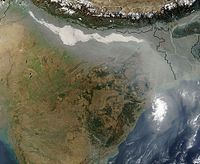
Photo from wikipedia
This special issue of Contemporary South Asia consists of five papers that were presented at the Annual Conference of the British Association of South Asian Studies (BASAS), which was held… Click to show full abstract
This special issue of Contemporary South Asia consists of five papers that were presented at the Annual Conference of the British Association of South Asian Studies (BASAS), which was held at Fitzwilliam College, University of Cambridge, 6–8 April 2016. It also includes the winner of the BASAS Annual Prize (2015), awarded to the best graduate paper presented at the BASAS Annual Conference held at the University of Portsmouth, 8–10 April 2015. The Annual Conference in Cambridge was hosted by the Centre of South Asian Studies, which was celebrating its 50th anniversary year, and attracted over 200 delegates from the UK, Europe, North America and South Asia. There was a rich programme, with scholarly presentations spread across three days in 42 parallel sessions. The keynote address was given by Professor William Gould (University of Leeds), whose essay is published in this issue. The last two years have been tumultuous, in terms of global politics. Unexpected electoral outcomes have unsettled political systems in the UK, USA and more widely in Europe. There have also been significant challenges to the roles of knowledge, expertise and scholarship in relation to public discourse. In many ways, similar trends have been visible in South Asia over a slightly longer period, with the last five years in particular witnessing: the emergence of populist political formations which have challenged established party structures (from the Tehreek e Insaf in Pakistan to the Aam Aadmi Party in India); the continued rise of identity-based political mobilization coupled with aggressive forms of nationalism (which have been rewarded with electoral success, such as the BJP’s victory in India’s 2014 General Elections); and an attempt to silence critical voices and those who dissent from mainstream narratives through an aggressive assault on intellectual freedoms. These concerns were already manifest by the time of the BASAS Conference at Cambridge in 2016, and were the subject of an important roundtable discussion at the Conference, on ‘Academic Freedom in South Asia’. The more recent assault on intellectual life which was visible during the Brexit and Trump campaigns of 2016 follows these trends from the subcontinent, and deliberations at the Conference, and many of the papers, focused on the implications of this new form of politics for the academy. While this special issue cannot do justice to the quality of dialogue that took place over three days in Cambridge, the selected papers do provide a flavour of some of the debates, and reflect some of the best contemporary scholarship in, and about, South Asia; but, also demonstrate how the concerns of the region reflect, resonate with and inform much wider debates beyond a narrowly constructed ‘Area Studies’.
Journal Title: Contemporary South Asia
Year Published: 2017
Link to full text (if available)
Share on Social Media: Sign Up to like & get
recommendations!